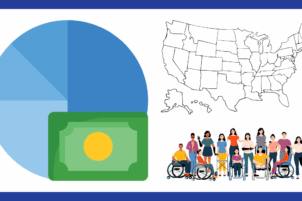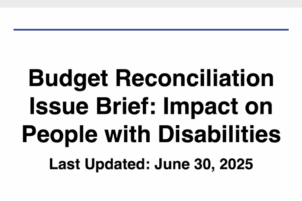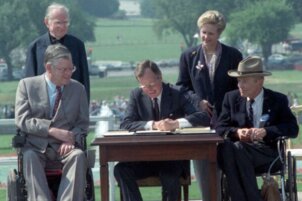With one-in-five people having a disability in the U.S. today, the lack of representation – just 3.1 percent on-screen and even less in children’s television (less than one percent) – means that millions of people are unable to see themselves in media today. The national disability advocacy nonprofit RespectAbility has been honored to play a part in changing this, including consulting on an array of films and TV shows for a variety of studios and networks. As part of a week-long celebration of the 30th anniversary of the Americans with Disabilities Act, RespectAbility highlighted examples of best practice in authentic casting and disability representation in Hollywood.
Moderated by actress and model Tatiana Lee, who also serves as RespectAbility’s Hollywood Inclusion Associate, one panel shined the spotlight on young adult entertainment media focusing on Ramy (Hulu) and Everything’s Gonna Be Okay (Freeform).
Shows like these demonstrate Hollywood’s changing tide and push for inclusion of creatives with disabilities, both in front of and behind the camera. As research shows, only 3.1 percent of all speaking or named characters in film were shown to have a disability in 2020. Trends show these numbers will increase, and these talented individuals are at the forefront of this industrial shift.
Ramy on Hulu
Earlier that day, Ramy was nominated for two Emmy Awards. Ramy Youssef, Egyptian-American Emmy winning comedian, writer, and star of the eponymous Ramy, discussed the nuances of accurately portraying the disparate identities of its main cast. Youssef, who is Muslim, commented on the weight his identity and the identity of co-star Steve Way (an actor and comedian with muscular dystrophy) anchor the show since the heart of Ramy lies in the friendship of the characters they portray. The specificity of their dynamic is what creates the organic connections that make the show feel real.
Youssef is also aware of the obstacles barring professionals with disabilities from breaking into the industry. “So there are all these barriers, which is why it’s really important anytime someone does have the opportunity to really advocate for someone who is actually in the role that we’re writing because, in many ways, it is the only way for them to be seen,” said Youssef, before describing the importance of writing and casting authentically along with the impact advocacy and allyship have on rectifying limitations affecting persons with disabilities.
Co-star Way, who also is a disability advocate, spoke about the larger implications his role has regarding representation for disability at large. “I’m not only a part of this groundbreaking and important series, but I’m able to tell stories from the disabled community that have never been seen before,” explained Way. “You know, whether it’s about death, working, dating, sex – there are concepts that many people have feared to really tackle on screen.”
Way added that he and Youssef are currently developing an original project for Apple Plus that will focus on Way and disability at large. “Basically, our goal is to kinda do Ramy for the disabled community, but with a lot less staring and dramatic pauses,” explained Way. “We’re really excited to really dive deeper into what is like living with a disability, you know, and what my family goes through, what my friends go through and really just showcase as many disabled performers as we possibly can.”
Everything’s Gonna Be Okay on Freeform
Kayla Cromer is a neurodiverse actress and activist who stars as Matilda on Freeform’s Everything’s Gonna Be Okay. When introducing her, Lee praised her for the role.
“You play a character that I love,” Lee buzzed. “You are quirky; you are fun; you are just a normal everyday teenager who just lives with autism.” Often, characters with disabilities fall into tropes that do a disservice to authentic representation. Disabilities are presented as the main character trait, while other qualities or substantive traits are relegated to afterthoughts if addressed. That is not the case with Cromer’s character.
“I want to see definitely more diverse characters in TV,” said Cromer. “Like, something that I’ve always said is cast someone in a wheelchair to play a prosecutor or a little person to play a college professor – reduces stigmas, create visibility, for audiences to see themselves on screen. We’re just not given the chances enough to audition for characters that weren’t written to be disabled.”
Cromer added that what she brings to the character of Matilda is realism. As a neurodiverse individual, some of the experiences Matilda has faced so has Cromer. Cromer implores creators to expand their visions of inclusivity when drafting and envisioning their future projects. The collection of intangible pieces of existence are imperative qualities overlooked when studios or producers choose to cast a non-disabled actor to play a disabled role instead of an actor who embodies the essence of a disability.
As the panel reached its denouement, a question from the audience regarding accessibility and accommodations on set prompts Way to share anecdotes from his time filming.
“It’s not being afraid to ask for accommodations,” he said, describing instances during the filming of Ramywhere he needed a break or repose from the hustle and demanding production schedule so he could be healthy. He believes honesty is the best policy when dealing with crews for production accommodations and stressed the importance of being upfront about his specific needs. Way also praised Youssef’s camaraderie and understanding.
“If you’re getting a talent who, you know what might only be able to do three-fourths of the day, it’s worth it,” added Youssef. “Because you’re getting a story that you wouldn’t be able to get without that person. That person is so uniquely qualified.”
Youssef stressed that Way stays for the long shoots but may occasionally need scenes pushed up as an accommodation. Youssef ended with a call to people in positions of power to make these accommodations commonplace so more diverse bodies will be captured on camera, thus expanding the tapestry of unique storytelling.







